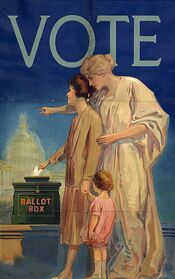U.S. Virgin Islands 2020 ballot measures
| 2020 U.S. Virgin Islands ballot measures |
|---|
| 2020 U.S. state ballot measures | |
|---|---|
2021 »
« 2019
| |
 | |
| Overview | |
| Scorecard | |
| Tuesday Count | |
| Deadlines | |
| Requirements | |
| Lawsuits | |
| Readability | |
| Voter guides | |
| Election results | |
| Year-end analysis | |
| Campaigns | |
| Polls | |
| Media editorials | |
| Filed initiatives | |
| Finances | |
| Contributions | |
| Signature costs | |
| Ballot Measure Monthly | |
| Signature requirements | |
Have you subscribed yet?
Join the hundreds of thousands of readers trusting Ballotpedia to keep them up to date with the latest political news. Sign up for the Daily Brew.
| |
One territorial ballot measure was certified to appear on the ballot in the U.S. Virgin Islands on November 3, 2020.
On the ballot
- See also: 2020 ballot measures
| Type | Title | Subject | Description | Result |
|---|---|---|---|---|
| LRSS | Constitutional Convention Question | Constitution | Asks voters about holding a constitutional convention |
Getting measures on the ballot
Citizens
In the United States Virgin Islands (USVI), citizens have the power to initiate territorial statutes. In 1986, the U.S. Congress passed House Resolution 2478 (HR 2478) granting the people of the U.S. Virgin Islands the power to initiate legislation and recall elected officials. President Ronald Reagan (R) signed the bill on August 27, 1986. USVI Delegate Ron de Lugo (D) sponsored HR 2478.[1]
In USVI, the number of signatures required to get an initiated state statute placed on the ballot is equal to 10 percent of the registered voters of each legislative district or 41 percent of all registered voters of the Virgin Islands. USVI also requires initiative sponsors to submit signatures equal to 1 percent of the registered voters of each legislative district or 4 percent of all registered voters of the Virgin Islands with the initial petition application.[2]
Proponents are given 180 days to collect signatures after the ballot title is written, and signatures are filed with the supervisor of elections, who determines whether enough signatures are valid.[2]
As ballot initiatives are indirect in USVI, proposals with an adequate number of valid signatures are transferred to the Legislature of the Virgin Islands. The Legislature has the option to approve, reject, or take no action on the initiative. Approval enacts the initiative as law, keeping the initiative off the ballot. Otherwise, the initiative goes on the ballot for voter consideration. The legislature can also offer an alternative proposal to appear on the ballot alongside the initiative as a competing measure.[2]
Legislature
The Legislature of the Virgin Islands can refer territorial statutes to the ballot for voter consideration. The territorial Legislature must pass the referrals, and then the USVI Governor must sign them, for them to appear on the ballot.
See also
External links
Footnotes


